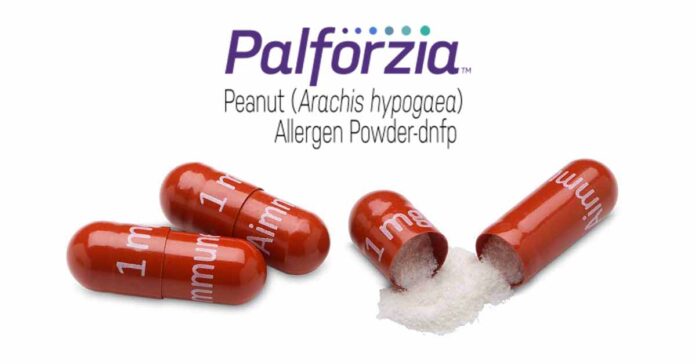BRISBANE, Calif.– Aimmune Therapeutics, Inc., a Nestlé Health Science company developing pharmaceutical therapies to prevent, manage, and treat food, gastrointestinal (GI), and metabolic-related diseases, will present for the first time results from the Phase 3 POSEIDON (Peanut Oral Immunotherapy Study of Early Intervention for Desensitization) study. The trial evaluated the efficacy and safety of PALFORZIA® [Peanut (Arachis hypogaea) Allergen Powder-dnfp] in peanut-allergic children aged 1 to 3 years. These findings will be presented at the American College of Allergy, Asthma & Immunology (ACAAI) 2022 Annual Scientific Meeting in Louisville, Kentucky on Saturday, November 12, 2022.
The study met the primary outcome, with the majority of patients treated with PALFORZIA tolerating at least a 600 mg single dose (1,043 mg cumulative) or 1,000 mg single dose (2,043 mg cumulative) of peanut protein (73.5% and 68.4%, respectively, compared to 6.3% and 4.2% of patients who received placebo, respectively). In addition, the majority of patients treated with PALFORZIA (61.2% compared with 2.1% of placebo-treated patients) tolerated the highest exit double-blind, placebo-controlled exit food challenge (DBPCFC) dose level of 2,000 mg (4,043 mg cumulative), and the median highest tolerated dose of peanut increased 66-fold between baseline and exit DBPCFC.
PALFORZIA demonstrated a favorable safety profile. Overall, 84.7% of patients on PALFORZIA and 93.8% of patients on placebo completed the study. There were no PALFORZIA-related serious or severe adverse events (AEs), and systemic allergic reactions due to any cause were similar between PALFORZIA and placebo-treated patients (8.1% and 8.3%, respectively). Treatment-related systemic allergic reactions occurred in 2% of PALFORZIA-treated patients and 0% of placebo-treated patients.
“These results indicate that treatment with PALFORZIA in young children resulted in a clinically meaningful change in the amount of peanut they could tolerate during oral challenge,” said Stephen Tilles, M.D., Senior Medical Director and Global Head of Medical Affairs, Allergy for Aimmune Therapeutics. “Currently, there is a high unmet need for these young children with peanut allergy who rely on avoidance alone, and treatment at this early age presents a unique window of opportunity to actively manage their peanut allergy near the time of diagnosis.”
Peanut allergy is one of the most common food allergies in the world, affecting more than 1.6 million children and teens in the U.S. i Reactions to peanut are potentially life-threatening, accounting for the majority of deaths related to food allergy.ii
“In my treatment of children aged 4 through 17 with PALFORZIA, I have seen firsthand the benefits of this therapy,” said George du Toit, M.B., B.Ch., Professor of Pediatric Allergy at Evelina London Children’s Hospital, Guy’s and St Thomas’ NHS Foundation Trust, King’s College London and study investigator in PALFORZIA clinical trials. “I am now encouraged by these promising results in younger children, which show that the majority of study participants tolerated a dose of 600mg of peanut protein – the equivalent of two peanut kernels – after 12 months of treatment, and no severe systemic allergic reactions and only infrequent mild-moderate systemic allergic reactions reported among PALFORZIA-treated participants.”
“Parents of children with peanut allergy may not be able to constantly supervise them outside of the home to avoid accidental exposure to peanut,” said Amy M. Scurlock, M.D., Professor of Pediatrics, University of Arkansas for Medical Sciences and Arkansas Children’s Hospital. “The encouraging results of the POSEIDON study indicate that PALFORZIA has the potential to be an effective and convenient treatment option for peanut-allergic children aged 1 to 3 years. These outcomes are welcome news for the many parents and young children impacted by this condition.”
PALFORZIA is currently approved by the FDA as an oral immunotherapy (OIT) for the mitigation of allergic reactions, including anaphylaxis, that may occur with accidental exposure to peanut in patients aged 4 through 17 years with a confirmed diagnosis of peanut allergy.
Aimmune plans to submit the full POSEIDON study results for publication in a peer-reviewed journal and submit these study results to the FDA in the first half of 2023 to support the use of PALFORZIA in appropriate peanut-allergic children aged 1-3 years, subject to review and approval by FDA.
POSEIDON enrolled 146 patients, with 98 randomized to PALFORZIA and 48 randomized to placebo. Overall, 84.7% of patients on PALFORZIA and 93.8% of patients on placebo completed the study.
Efficacy results:
- 73.5% and 68.4% of patients treated with PALFORZIA tolerated a single dose of 600 mg and 1,000 mg of peanut protein compared with 6.3% and 4.2% of patients in the placebo group, respectively, with a treatment difference of 67.2% and 64.2% (p<0.0001 for both).
- 61.2% of PALFORZIA-treated patients tolerated the highest dose level in the exit DBPCFC of 2,000 mg (cumulative 4,043 mg) compared with 2.1% of placebo-treated patients, with a treatment difference of 59.1% (p<0.0001).


